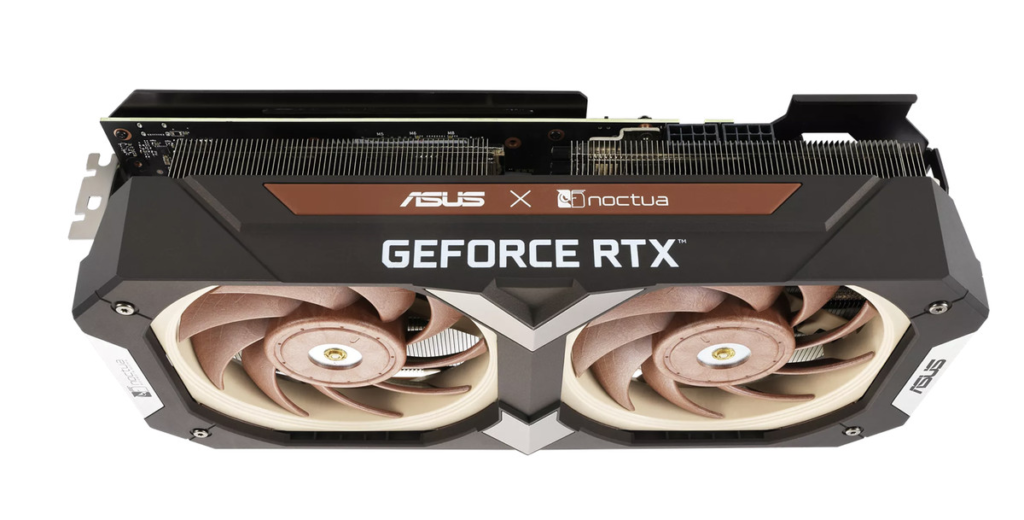Asus has teamed up with renowned fan manufacturer Noctua once again to make a large brown and tan graphics card that should pump out frames while staying relatively quiet. The two companies’ last collaboration was an RTX 3070, but now they’ve announced a decidedly enthusiast tier card: an RTX 3080.
According to Noctua’s press release, the card features two 120mm fans and a custom heatsink, making it “the quietest air-cooled graphics card in its class.” Apart from the fancy cooling, it’s a relatively standard Asus graphics card with two BIOS profiles, a backplate, and 10GB of GDDR6X RAM. There are 3080s with 12GB of memory, but that doesn’t seem to be an option with the Noctua heatsink.
The card will go on sale “starting early June 2022,” though whether you’ll be able to buy one is another question entirely, with chip shortages and stock wonkiness still plaguing the GPU market. In a perfect world, you wouldn’t have to compete with crypto miners for the card — like most Nvidia cards nowadays it’s a Lite Hash Rate model with reducing mining capabilities. Though, given that hackers have found a way around that, the bets may be off there.
There is one way the card isn’t quite standard: it is big. For one, Noctua’s “custom-engineered unified heatsink” is thicker than Asus’ standard one, according to a webpage breaking down its performance versus regular cards. It’s also got literal desktop fans in it: Noctua’s NF-A12x25 PWM model. This leads to it being around 3.25-inches thick, according to Asus’ spec sheet, almost an inch thicker than the company’s triple-fan Strix 3080. That means it’ll take up a whopping four slots in your PC — and still have a tiny bit of overhang into the next slot’s space.
For some people, that may not be worth it. One of my co-workers, for example, feels like there has to be a more interesting or better solution than just sticking some full-size fans on it and calling it a day. He probably wouldn’t be particularly impressed looking at the performance specs either; the Noctua 3080 has an “OC Mode” boost clock of 1815MHz and a “Gaming Mode” boost clock of 1785MHz. That’s pretty much the same as Asus’ standard 3080s, but the Strix model puts out significantly higher numbers: 1935MHz in OC Mode and 1905MHz in Gaming Mode.
Noctua isn’t usually about redline performance, though; it’s about good performance while making as little noise as possible. Noctua says that “at typical auto-speed fan settings” its 3080 will be 4.5 dB(A) quieter than Asus’ TUF-series model, while running 3 degrees Celsius cooler on the GPU cores. When the cooler’s running all out, it says, Noctua’s will be 1 degree Celsius cooler and 8.6 dB(A) quieter.
For people who want performance but don’t want to hear it (hi, it’s me), it could be a good option — or at least that was the consensus with the 3070 version of this card. We’ll likely have to wait until independent testers get their hands on it to see if Noctua’s cooler can stay quiet while trying to contain the 3080’s significant power.
As for pricing, Noctua’s press release says to “contact your local ASUS representative for further information on pricing,” and Asus’ website doesn’t have pricing info. Asus’ “entry-level” 3080s are going for around $850, and the fancier models can cost close to $1,100.
Based on the pricing of the 3070 edition, the Noctua edition will likely come with a price premium; on Newegg, an Asus Dual RTX 3070 V2 OC goes for around $760, where the Noctua OC Edition goes for $854. Asus’ Strix model, which has higher boost clocks than both models, goes for $806. Do take these comparisons with a grain of salt; they’re third-party store prices (though the same third-party store), and we’re not quite out of the bizarre-o GPU pricing woods quite yet.
There’s also the question of whether you should even be buying a high-end 30-series card at this point. There are rumors that Nvidia’s going to release the 4090 in July, kicking off its next generation of cards. Given how long it’s been since the 3080 was launched, it could be quite a while before we see a Noctua-equipped 4090.

